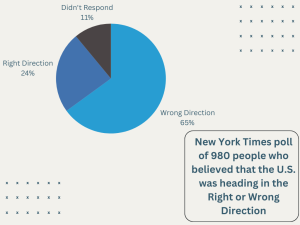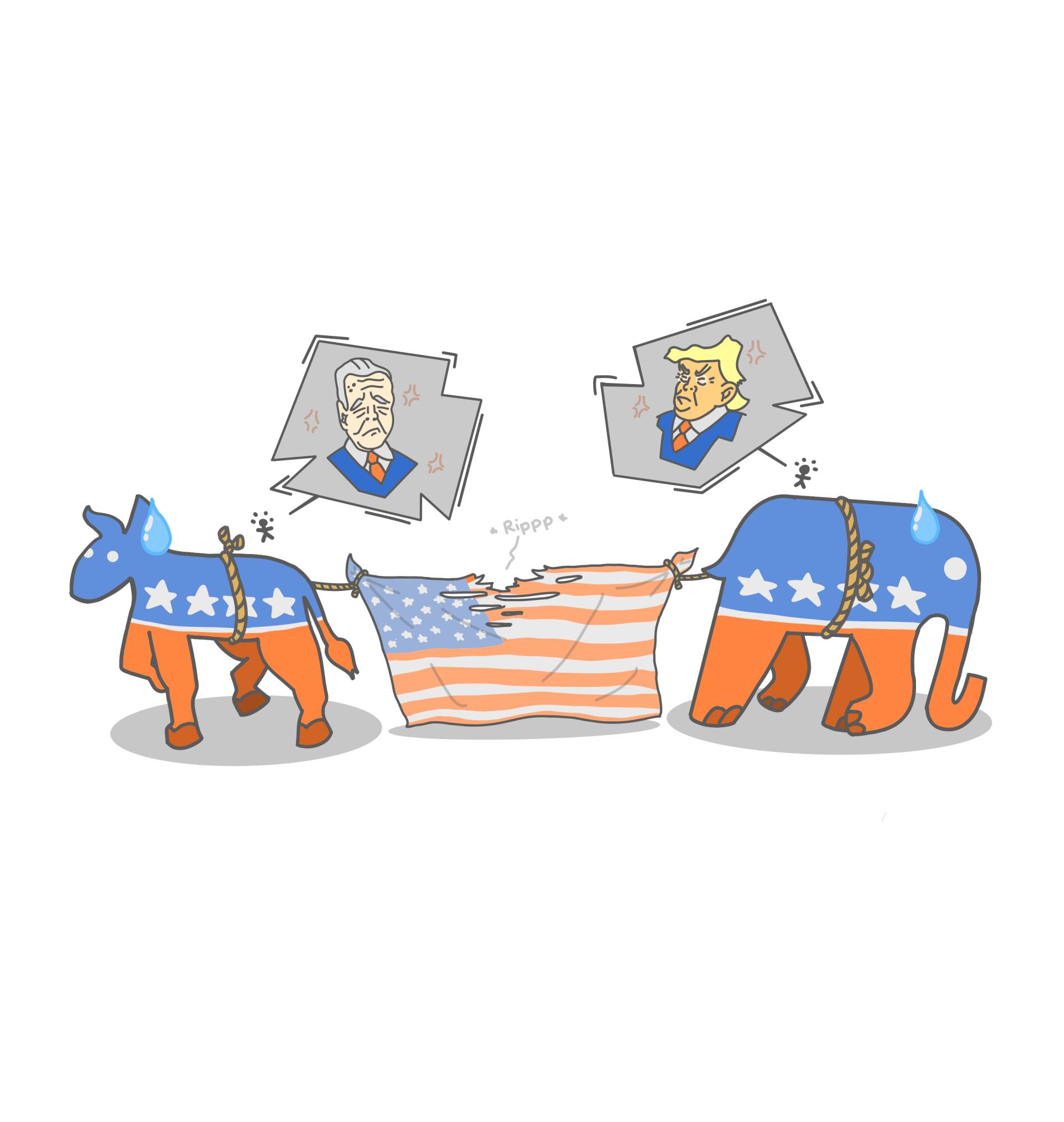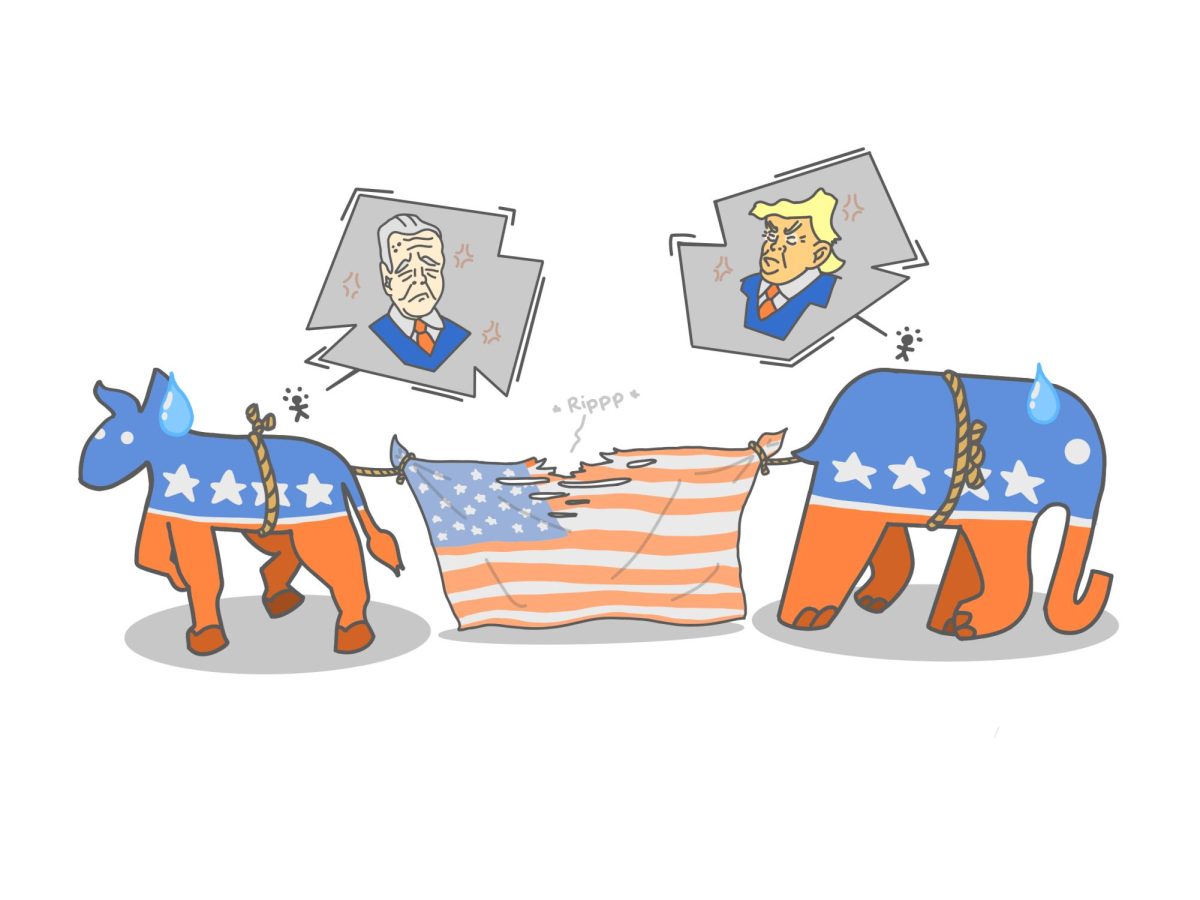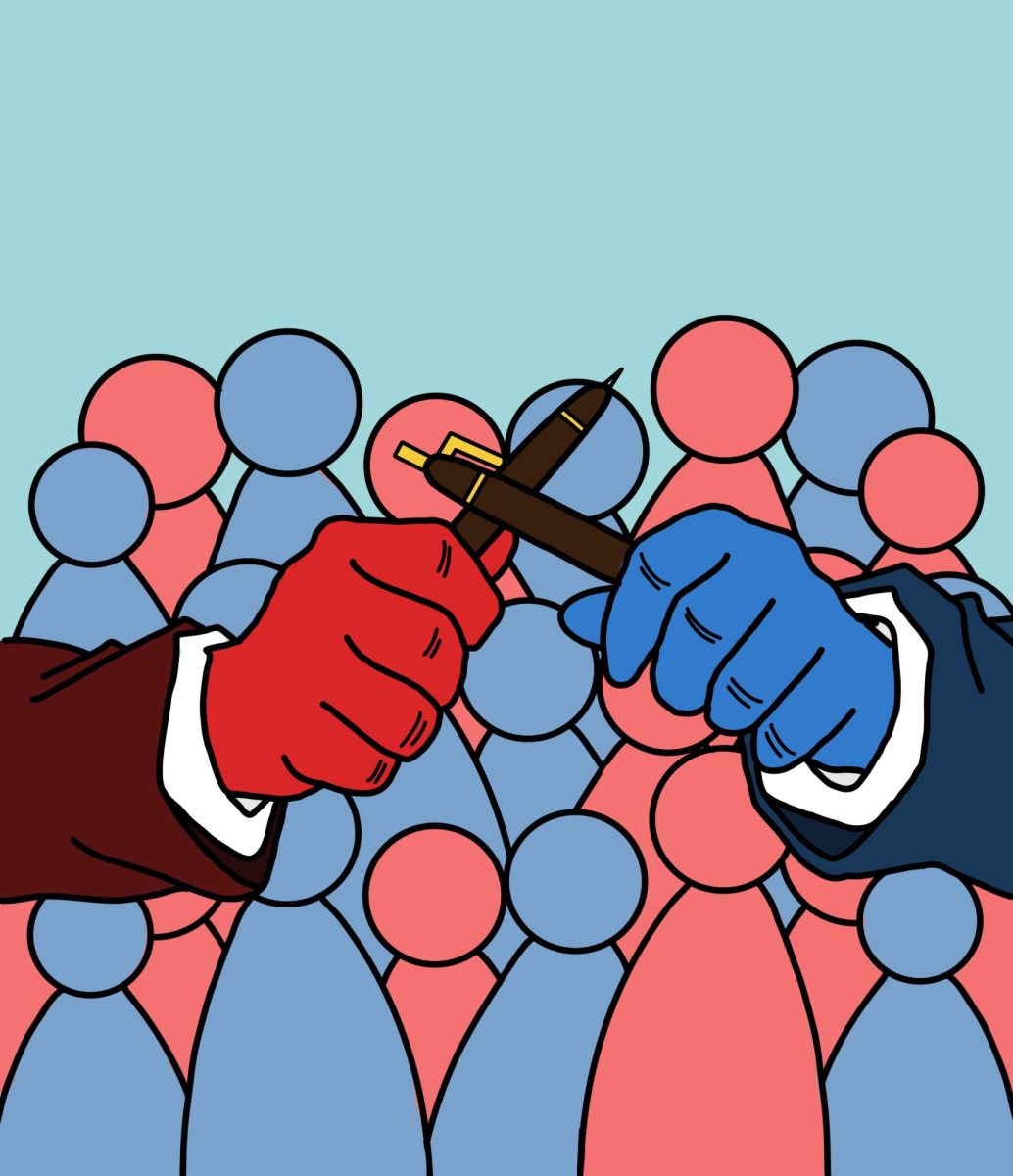Elections have consequences.
Every four years, voters experience these consequences when a new president is elected and that person works to set administrative policies to implement their favored policies. Despite an apparent lack of enthusiasm for the two candidates heading the Republican and Democratic parties, young voters are expected to have a significant impact on whichever one wins the election on Nov. 5.
After former President Donald Trump and current President Joe Biden, secured enough delegates to win their parties’ nominations, the primary season ended anti-climatically. Now that they are done competing in their parties’ primaries, voters are taking a look at both of these men’s records as president and where they stand on the issues that they care about.
Both candidates have different views on dealing with border security, managing the economy, and how to project or restrict Americans’ rights.
Despite a tumultuous term in office, Trump held a 4 percent advantage over President Joe Biden in a New York Times/Siena College poll of likely voters released on March 2.
Of respondents who said they were likely to vote, 48 percent said they would vote for the former president if the presidential election were to be held today, with 44 percent responding they would vote for Biden. Among registered voters, Trump had support from 48 percent of respondents and Biden 43 percent.
However, polling results can shift over time and response rates can conflict with other polls. For example, on April 7, a poll conducted by NPR/PBS NewsHour/Marist found that President Biden and former President Donald Trump are statistically tied, with Biden holding a slim 2-point lead, 50%-48%.
Although these two candidates and the policies they have supported are well known, there is still a chance that voters could change their support for either of them. The NPR/PBS NewsHour/Marist survey found that 40% of respondents said they are at least open to changing their minds.

Many Americans and Akins students are looking back at Trump’s policies compared to Biden’s policies, to make their decision.
On the other hand, many students/people believe that voting isn’t important. However, many people agree that you have to vote if you want your voice to be heard. While the U.S. isn’t democratic in that if the candidate you were voting for wins the popular vote, they become president, however, the vote you cast can influence the outcome of the presidential election. The League of Women Voters explains the electoral college as, “when the average person casts their vote in a federal election, they’re voting for the electors who’ll cast the final votes for President and Vice President.”
Issues on everyone’s mind include the economy, equal rights, women’s reproductive rights, climate change, ongoing wars the US is involved with overseas, and border security. Trump and Biden are known for supporting different policies. For example, Trump pulled out of the Paris Agreement, which would require all participating countries to reduce CO2 emissions by 50% by 2030. However, when Biden took office, on his first day, he rejoined the Paris Agreement. Similarly, there are many other examples of Biden’s policies. that Trump has vowed to reverse on his first day in office if he is elected, again.
One of the many issues that many Akins students and U.S. citizens are worried about for the 2024 election is border security. Since the first days of his first campaign to win the presidency in 2015, Trump has made cracking down on illegal immigration a central issue. Trump famously said that he intended to use billions of dollars to build a wall along the U.S.’s Southern border with Mexico, which is about 2,000 miles long. During the COVID-19 pandemic, Trump implemented an emergency public health order known as Title 42, which enabled federal border agents to quickly turn away migrants who came to the U.S.-Mexico border on the grounds of preventing the spread of COVID-19 Before Title 42 health order, it was easier for border crossers to enter the United States and then ask for asylum. However, under Title 42, immigrants were immediately turned away at the border. According to an article by the Associated Press, immigration officials have used the health order more than 2.8 million times to expel migrants, many of whom have been removed multiple times after making repeated attempts to enter the U.S. at the southern border.
Biden initially kept Title 42 in place after he took office, then tried to end its use in 2022. Republicans sued, arguing the restrictions were necessary for border security. Courts kept Title 42 in place until the Biden administration announced in January that it was ending national COVID-19 emergencies. The Title 42 border restrictions in May of 2023.
Biden has said changes to rules for border crossing are necessary because Congress has not passed immigration reform in decades. A bipartisan compromise bill that would have tightened immigration rules and sped up the processing of asylum and border-crossing cases, died after Trump told Republicans in Congress not to vote for the bill.
Biden has also sparred with Republican Greg Abbott on immigration issues after the Texas Governor implemented “Operation Lone Star in March of 2021. This state operation has sent
officers with the Texas Department of Public Safety Officers and members of the Texas National Guard to the border in an attempt to stop people from crossing the border. While it is controversial in many aspects, it has led to a legal showdown between the federal and state governments. The Biden administration has sued Abbott for attempting to enforce laws that have been under the jurisdiction of the federal government for decades.
Whatever happens in the courts regarding these legal battles, how Biden and Trump plan to handle border security and immigration issues will remain hot topics for voters to consider in the months ahead of the election.
Tik Tok Ban?
In 2020, President Trump issued an executive order banning TikTok declaring that TikTok was a national security, economic, and foreign policy of the United States. The Supreme Court eventually overturned that executive order and President Biden revoked Trump’s executive order banning TikTok. In 2023, both Democrats and Republicans tried to pass a bill in the form of the RESTRICT Act, which would give the Secretary of Commerce power to ban applications from foreign adversaries. That bill never made it through Congress.
However, on March 13, the US House of Representatives suddenly and overwhelmingly passed a bill that allows TikTok to effectively be banned if ByteDance, the Chinese company that owns it, doesn’t sell it to an American company. Biden has said if the bill passes Congress, that he will sign it. However, recently President Trump has said that he doesn’t support a TikTok ban despite trying to ban it himself in 2020. In an interview with CNBC, Trump said that he still believes TikTok is a threat however, Facebook would be a big beneficiary and that Facebook is “a true Enemy of the People.”
Trump became very anti-Facebook as accusations about the company spread in conservative social media in the conspiracy-laden films “Rigged: The Zuckerberg Funded Plot to Defeat Donald Trump” and 2000 Mules. Both of these films both claim that the 2020 election was stolen. “Rigged” claims that Mark Zuckerberg participated in voter fraud along with his company Meta. Since viewing that film, Trump has believed that banning TikTok wouldn’t be in the best interest of the country.
Sources close to Trump have said that his opposition to a TikTok ban is about courting Gen Z voters. A Pew Research Survey found that support for banning TikTok is about 18% for 13-17-year-olds. There are roughly 68.6 million Gen Z members, which is roughly 20% of the United States population according to the U.S. Census Bureau.
When Biden canceled Trump’s executive order, he said that it was not done in “the soundest fashion.” Instead, he issued a new executive order that would establish criteria, to evaluate national security risks posed by applications that enemies of the United States host.
In 2023, Biden’s campaign said that they wouldn’t join TikTok, rather their goal was to steer clear of using TikTok, rather they would use influencers to help their campaign. However, in February of 2024, Biden’s campaign joined TikTok. Biden’s deputy campaign manager told Wired in an interview that their goal was to “make sure we’re reaching people in as many places as possible.”Although Biden’s campaign is using TikTok, Biden has said that he still fully supports the proposed TikTok ban. Despite all the mixed messages both candidates have sent, TikTok’s future in the U.S. is cloudy.
Economic uncertainty
Both Trump and Biden are constantly talking about the state of the economy on the campaign trail and voters are listening. They are each trying to make the case that they would be better at managing the economy and stimulating economic growth.
According to a PolitiFact article that tries to fact-check the candidates’ claims on the economy, there’s not a simple answer for who has been better on economic issues.
“On the numbers, Biden has some advantages over Trump, and vice versa,” wrote Luis Jacobson. “Other economic statistics show both presidents putting up impressive numbers during their first three years in office.”
President Biden and former President Trump both have very different economic policies. For example, Trump instituted tax cuts, tried to repeal the Affordable Care Act, and implemented tariffs on products manufactured in China.
Trump also pushed to renegotiate a treaty between the U.S., Canada, and Mexico called the North American Free Trade Agreement (NAFTA). The new treaty, known as the United States, Mexico Canada Agreement, addresses products that weren’t around when NAFTA was written. It aimed to support fairer trade and extend copyright protections to 70 years.
Presidents often have to face unpredictable and difficult-to-control economic issues such as the economic losses the country faced when the COVID-19 pandemic forced schools to shut down and businesses to slow production.
Trump signed the Coronavirus Aid, Relief, and Economic Security (CARES) Act to deal with the economic slowdown. It also created a larger budget deficit of $3.1 trillion for the 2020 fiscal year. Gross Domestic Product (GDP) also dropped as the pandemic went on. Trump left office with 3 million fewer jobs than when he started.
When Biden took office in 2021, he was dealing with high inflation, record unemployment, and high debt accumulation.
Biden’s economic policies have focused on infrastructure investments, attempting to increase the national minimum wage, expanding access to affordable healthcare, and canceling student loan debt. Biden also signed into law the Creating Helpful Incentives to Produce Semiconductors and Science Act (CHIPS), which will provide$40 billion in funding to semiconductor companies to build fabrication facilities to build semiconductor chips in the United States.
Biden also signed into law the Inflation Reduction Act, which lowered prescription drug prices, helped to lower the government budget deficit, and aims to lower CO2 emissions by 2040.
Reproductive Freedom
On June 24, 2022, the U.S. Supreme Court overturned 50 years of precedent with its decision in Dobbs v. Jackson Women’s Health Organization, which ended the constitutional right to an abortion. This would lead to many laws being passed in many states banning abortions, while some states allow abortions. Three of the Supreme Court justices who voted to overturn Roe v. Wade were appointed by Trump.
Trump also enacted many policies including blocking abortion clinics from accessing federal funds, restricting the U.S. government from providing funds to international family planning organizations, and rolling back a rule that was supposed to help shrink the gender pay gap.
President Biden has focused on making both women and men more equal. He started by appointing a black woman, Kamala Harris as his vice president. President Biden has also attempted to enshrine abortion rights into federal law.
In his State of the Union address, Biden called on Congress to set aside $12 billion to research women’s health. Biden has tried to champion himself on women’s rights, repeatedly attacking Trump for taking away the right to an abortion.
This November will most likely see a rematch of the 2020 presidential election. Many key issues are on the table, and voters are trying to decide who will do the best job as president. Some look back on Trump’s presidency and think it was a good presidency, and some could say the same about Biden’s time in the White House.
With many members of the Class of 2024 turning 18 and becoming eligible to vote in the November elections, their vote or lack of voting could have a significant effect on the outcome of who serves as president for the next four years, and which of their policies we will all live with.
Many Americans and Akins students are looking back at Trump’s policies compared to Biden’s policies, to make their decision.
On the other hand, many students/people believe that voting isn’t important. However, many people agree that you have to vote if you want your voice to be heard. While the U.S. isn’t democratic in that if the candidate you were voting for wins the popular vote, they become president, however, the vote you cast can influence the outcome of the presidential election. The League of Women Voters explains the electoral college as, “when the average person casts their vote in a federal election, they’re voting for the electors who’ll cast the final votes for President and Vice President.”












